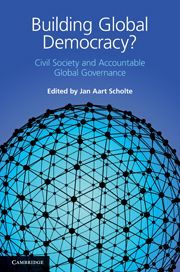Book contents
- Frontmatter
- Contents
- List of figures
- Participants in the Gothenburg Workshop
- List of contributors
- Editor's acknowledgements
- List of abbreviations
- Introduction
- 1 Global governance, accountability and civil society
- 2 Civil society and accountability of the United Nations
- 3 The World Bank and democratic accountability: the role of civil society
- 4 Civil society and IMF accountability
- 5 Civil society and the WTO: contesting accountability
- 6 Civil society and accountability in the Commonwealth
- 7 The Organisation of the Islamic Conference: accountability and civil society
- 8 Civil society and patterns of accountability in the OECD
- 9 Civil society and G8 accountability
- 10 Structuring accountability: civil society and the Asia-Europe Meeting
- 11 Civil society and accountability in the global governance of climate change
- 12 Civil society and accountability promotion in the Global Fund
- 13 Accountability in private global governance: ICANN and civil society
- 14 Civil society and the World Fair Trade Organization: developing responsive accountability
- Conclusion
- Bibliography
- Index
2 - Civil society and accountability of the United Nations
Published online by Cambridge University Press: 05 June 2012
- Frontmatter
- Contents
- List of figures
- Participants in the Gothenburg Workshop
- List of contributors
- Editor's acknowledgements
- List of abbreviations
- Introduction
- 1 Global governance, accountability and civil society
- 2 Civil society and accountability of the United Nations
- 3 The World Bank and democratic accountability: the role of civil society
- 4 Civil society and IMF accountability
- 5 Civil society and the WTO: contesting accountability
- 6 Civil society and accountability in the Commonwealth
- 7 The Organisation of the Islamic Conference: accountability and civil society
- 8 Civil society and patterns of accountability in the OECD
- 9 Civil society and G8 accountability
- 10 Structuring accountability: civil society and the Asia-Europe Meeting
- 11 Civil society and accountability in the global governance of climate change
- 12 Civil society and accountability promotion in the Global Fund
- 13 Accountability in private global governance: ICANN and civil society
- 14 Civil society and the World Fair Trade Organization: developing responsive accountability
- Conclusion
- Bibliography
- Index
Summary
Introduction
Established in 1945, the United Nations Organisation (UN) is the world's largest global governance institution. It encompasses almost universal state membership and addresses a full spectrum of issue areas. As of 2009 the UN Secretariat had 40,000 staff stationed around the world (UN 2009a). Another 120,000 persons from 116 countries were serving in 15 UN peacekeeping operations (UN 2010: 3). The regular budget of the core UN bodies (i.e. excluding related agencies and peacekeeping operations) came to US$5.2 billion in 2010, a figure that far exceeds that for any other global governance organisation examined in this book (UN 2009b).
Core organs of the UN include the General Assembly (GA), the Security Council (SC), the Economic and Social Council (ECOSOC), the Trusteeship Council, the International Court of Justice (ICJ) and the Secretariat. The wider UN system also comprises fifteen specialised agencies and a host of other related bodies. Civil society contributions to UN accountability often involve interrelations between the central bodies and the specialised agencies. However, for reasons of space and manageability, the present chapter focuses its attention on the core organs of the UN, rather than covering the full spectrum of related institutions. Other book-length works have considered civil society involvement in the wider UN system, albeit without a focus on accountability issues (e.g. Gordenker and Weiss 1996; Willetts 1996; Foster and Anand 1999; Joachim 2007; McKeon 2009).
- Type
- Chapter
- Information
- Building Global Democracy?Civil Society and Accountable Global Governance, pp. 42 - 57Publisher: Cambridge University PressPrint publication year: 2011
- 5
- Cited by



